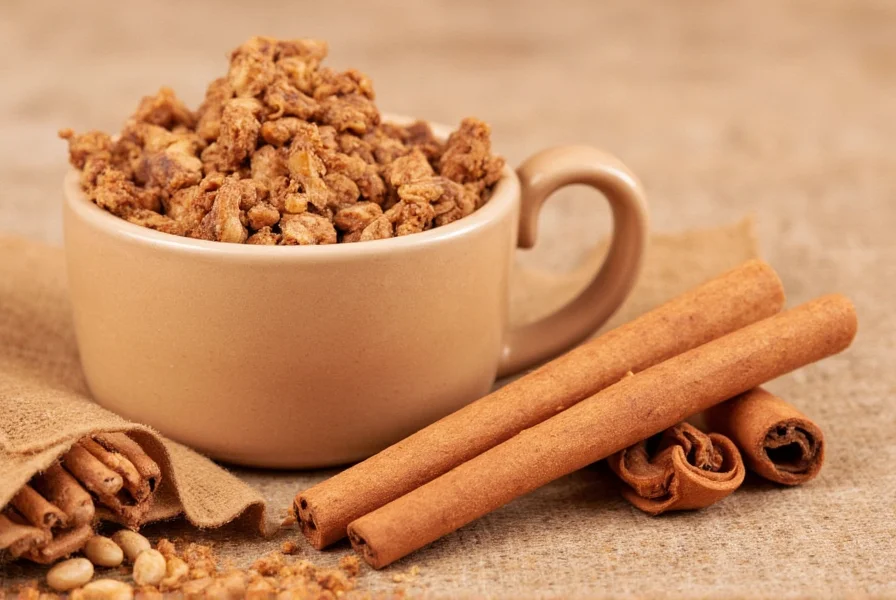Nature's sweet spice has been treasured for millennia, but modern science is now validating many of cinnamon's traditional health applications. This comprehensive guide examines the evidence behind cinnamon's therapeutic properties, helping you understand how this common kitchen staple can support your wellbeing when used appropriately.
The Science Behind Cinnamon's Healing Properties
Cinnamon derives its health-promoting effects primarily from cinnamaldehyde, the compound responsible for its distinctive flavor and aroma. This bioactive component works alongside powerful polyphenol antioxidants that combat oxidative stress. Unlike many supplements, cinnamon delivers these compounds through a whole-food matrix that enhances bioavailability. Recent clinical trials have particularly focused on cinnamon's impact on metabolic health, with promising results for those managing blood sugar levels.
Top 5 Evidence-Based Cinnamon Benefits
1. Blood Sugar Regulation
Multiple studies demonstrate cinnamon's ability to improve insulin sensitivity and lower blood glucose levels. A comprehensive meta-analysis published in the Journal of the Academy of Nutrition and Dietetics found that cinnamon supplementation reduced fasting blood glucose by an average of 24.59 mg/dL in individuals with type 2 diabetes. The spice appears to mimic insulin's effects and enhance glucose uptake by cells, making it particularly valuable for metabolic health. For optimal blood sugar management benefits, consistent daily consumption over 4-12 weeks shows the most significant results.
2. Anti-Inflammatory Effects
Chronic inflammation underlies many modern diseases, and cinnamon's potent anti-inflammatory compounds offer natural protection. Research in Molecular Nutrition & Food Research identified that cinnamaldehyde inhibits inflammatory signaling pathways, reducing markers like TNF-α and IL-6. These effects may help protect against inflammatory conditions ranging from arthritis to neurodegenerative diseases. The spice's anti-inflammatory action works synergistically with its antioxidant properties for comprehensive cellular protection.
3. Heart Health Support
Cinnamon demonstrates multiple cardiovascular benefits, including improved cholesterol profiles and blood pressure regulation. Clinical trials show regular cinnamon consumption can reduce total cholesterol by 12-26 points, lower LDL ('bad') cholesterol, and decrease triglycerides while maintaining HDL ('good') cholesterol levels. These lipid-modulating effects, combined with cinnamon's ability to improve blood vessel function, contribute to reduced cardiovascular risk. The spice's antioxidant properties also help prevent oxidation of LDL cholesterol, a key step in atherosclerosis development.
4. Antioxidant Powerhouse
With one of the highest antioxidant capacities among spices, cinnamon combats oxidative stress through multiple mechanisms. Its rich polyphenol content—including cinnamic acid, cinnamaldehyde, and proanthocyanidins—scavenges free radicals and boosts the body's natural antioxidant defenses. Studies measuring ORAC (Oxygen Radical Absorbance Capacity) values consistently rank cinnamon among the top antioxidant-rich foods. This antioxidant activity contributes to cinnamon's anti-aging effects and may help protect against chronic diseases linked to oxidative damage.
5. Neuroprotective Potential
Emerging research suggests cinnamon may protect brain health and cognitive function. Laboratory studies indicate that cinnamon compounds can inhibit the buildup of tau proteins and amyloid plaques associated with Alzheimer's disease. Animal research published in the Journal of Alzheimer's Disease demonstrated that cinnamon extract improved cognitive function in mice with Alzheimer's-like symptoms. While human studies are still limited, these preliminary findings suggest cinnamon's potential role in supporting long-term brain health.
| Cinnamon Type | Coumarin Content | Recommended Daily Limit | Best For |
|---|---|---|---|
| Ceylon ("True" Cinnamon) | 0.017 mg/g | Up to 6 grams | Daily therapeutic use, sensitive individuals |
| Cassia (Common Grocery Store) | 3.74 mg/g | Less than 1 gram | Occasional culinary use |
Understanding Cinnamon Varieties and Safety
Not all cinnamon delivers equal health benefits or safety profiles. The two primary varieties—Ceylon and Cassia—differ significantly in their chemical composition. Cassia, the more common and less expensive variety found in most supermarkets, contains high levels of coumarin, a compound that can cause liver damage in sensitive individuals when consumed regularly in large amounts. Ceylon cinnamon, sometimes called "true cinnamon," contains negligible coumarin levels, making it safer for therapeutic daily use. When selecting cinnamon for health purposes, look for "Ceylon" on the label or choose products specifically tested for low coumarin content.

Practical Usage Guidelines
For therapeutic benefits without risk, follow these evidence-based recommendations:
- Dosage: 1-6 grams (approximately ½ to 2 teaspoons) of Ceylon cinnamon daily
- Timing: Consume with carbohydrate-containing meals for optimal blood sugar effects
- Preparation: Mix with honey, add to oatmeal, or stir into coffee or tea
- Consistency: Regular daily consumption for at least 4-12 weeks to see measurable benefits
When incorporating cinnamon into your routine, start with smaller doses (¼ teaspoon daily) and gradually increase to assess tolerance. Those with liver conditions or taking medications metabolized by the liver should consult healthcare providers before regular therapeutic use.
Potential Side Effects and Precautions
While generally safe as a food spice, therapeutic cinnamon use requires awareness of potential concerns:
- Coumarin toxicity: Primarily with Cassia cinnamon, potentially causing liver damage
- Drug interactions: May enhance effects of diabetes medications, requiring blood sugar monitoring
- Allergic reactions: Rare but possible, especially in those sensitive to balsam of Peru
- Pregnancy considerations: High doses not recommended during pregnancy
Individuals with existing liver conditions should exercise particular caution and consider Ceylon cinnamon exclusively. Those taking diabetes medications should monitor blood sugar closely when adding cinnamon to their regimen, as it may enhance medication effects.
Maximizing Cinnamon's Health Benefits
To get the most from cinnamon's therapeutic properties, combine it with complementary foods and practices:
- Pair with honey for enhanced antimicrobial effects
- Add to green tea to boost overall antioxidant activity
- Combine with black pepper to increase absorption of beneficial compounds
- Use in post-workout smoothies to support muscle recovery through reduced inflammation
For culinary applications that preserve maximum benefits, add cinnamon toward the end of cooking rather than at the beginning, as prolonged heat exposure can degrade some active compounds. Storing cinnamon in an airtight container away from light helps maintain its potency over time.

Conclusion: Cinnamon as Part of a Healthy Lifestyle
Cinnamon represents a powerful example of how traditional foods contain significant therapeutic potential. When used appropriately—particularly the safer Ceylon variety—it offers multiple health benefits supported by growing scientific evidence. While not a replacement for medical treatment, regular cinnamon consumption can be a valuable component of a comprehensive approach to metabolic health, inflammation reduction, and disease prevention. As with any natural remedy, consistency and appropriate dosage are key to experiencing cinnamon's full benefits while minimizing potential risks.
How much cinnamon should I take daily for health benefits?
For therapeutic benefits, research suggests 1-6 grams (approximately ½ to 2 teaspoons) of Ceylon cinnamon daily. Cassia cinnamon should be limited to less than 1 gram per day due to higher coumarin content. Start with smaller doses (¼ teaspoon) and gradually increase while monitoring your body's response.
Can cinnamon really help control blood sugar levels?
Yes, multiple clinical studies show cinnamon can improve blood sugar control. Research indicates it may lower fasting blood glucose by 10-29% in people with type 2 diabetes by improving insulin sensitivity and slowing carbohydrate breakdown. Benefits typically become noticeable after 4-12 weeks of consistent daily use.
What's the difference between Ceylon and Cassia cinnamon for health benefits?
Ceylon cinnamon ("true cinnamon") contains significantly less coumarin (0.017 mg/g) than Cassia (3.74 mg/g), making it safer for regular therapeutic use. Both varieties offer similar health benefits, but Ceylon allows for higher daily consumption without liver toxicity concerns. For daily health use, Ceylon is preferred, while Cassia is suitable for occasional culinary use.
When is the best time to take cinnamon for maximum benefits?
For blood sugar management, consume cinnamon with carbohydrate-containing meals, as it helps slow glucose absorption. Many people find adding it to breakfast foods like oatmeal or morning coffee provides optimal metabolic benefits. For general health maintenance, consistent daily consumption at any time yields the best long-term results.
Are there any medications that interact with cinnamon?
Cinnamon may enhance the effects of diabetes medications, potentially causing blood sugar to drop too low. It may also interact with certain liver-metabolized drugs due to coumarin content, particularly with Cassia cinnamon. If you take medications for diabetes, liver conditions, or blood thinning, consult your healthcare provider before using cinnamon therapeutically.











 浙公网安备
33010002000092号
浙公网安备
33010002000092号 浙B2-20120091-4
浙B2-20120091-4